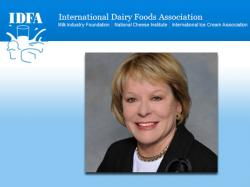Statement Of Connie Tipton, IDFA President & CEO, On The Dairy Security Act Of 2011
September 29, 2011 | 2 min to read

Washington, D.C. – “The Dairy Security Act of 2011 continues a complex, government milk pricing system that forces higher prices on fluid milk and penalizes producers who want insurance by forcing them to accept mandatory supply controls. Unfortunately, these provisions are unacceptable to our members and we oppose H.R. 3062.
“IDFA opposes milk pricing regulations that increase the already significant regulatory burden on processors, put pressure on declining milk sales, and increase costs for consumers, as well as many government nutrition and feeding programs that are already stretched to serve Americans who are struggling to feed their families.
“This new legislation, if passed, would change the process for revising the out-of-date Federal Milk Marketing Order system by effectively giving dairy farmer cooperatives the power to veto rules that the Secretary of Agriculture would develop in the public interest. This is a “heads, consumers lose, or tails, consumers lose” process. By contrast, processors would not be given any vote or say in the adoption of regulations that directly impact their businesses.
“IDFA continues to oppose any form of supply management, especially at a time of great market opportunity for its members and the entire U.S. dairy industry. IDFA supports offering dairy producers risk management tools without any strings attached."
The International Dairy Foods Association (IDFA), Washington, D.C., represents the nation's dairy manufacturing and marketing industries and their suppliers, with a membership of 550 companies representing a $110-billion a year industry. IDFA is composed of three constituent organizations: the Milk Industry Foundation (MIF), the National Cheese Institute (NCI) and the International Ice Cream Association (IICA). IDFA's 220 dairy processing members run more than 600 plant operations, and range from large multi-national organizations to single-plant companies. Together they represent more than 85 percent of the milk, cultured products, cheese and frozen desserts produced and marketed in the United States.
Source: The International Dairy Foods Association
